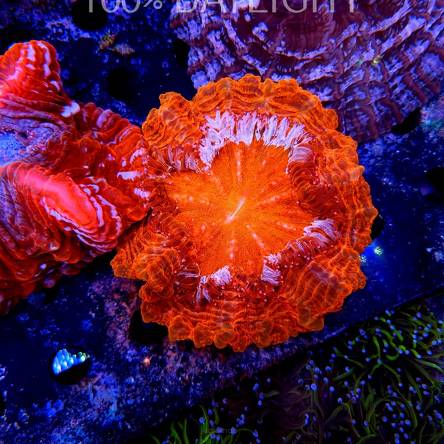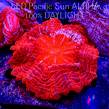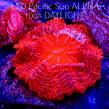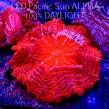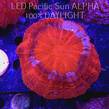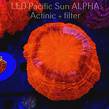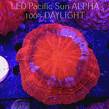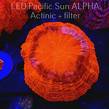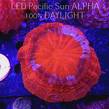Acanthophyllia deshayesiana ULTRA Australia (03.08.2024) 12cm
- Manufacturer: JadwigaMorska
-
Availability:
 None
(0 pcs.)
None
(0 pcs.)
- pcs.
- €501.59
Acanthophyllia deshayesiana Species Description and Care:
Species Description:
-
Scientific Name: Acanthophyllia deshayesiana
-
Common Name: Acanthophyllia, Warty Coral
-
Origin: This species is native to the waters of Australia, found in the Great Barrier Reef area and surrounding regions.
Physical Description:
-
Acanthophyllia deshayesiana has a distinctive appearance with large polyps surrounding a calcareous skeleton.
-
The colors of this species can vary and include shades of pink, purple, green, blue, and brown. It is one of the most colorful LPS coral species.
-
The polyps of Acanthophyllia deshayesiana are prominently convex and often exhibit characteristic bulges on the surface, giving them a "warty" appearance.
-
Polyp sizes can vary, but in captivity, they typically reach an average diameter of 4-6 inches (10-15 cm).
Care Requirements:
-
Acanthophyllia deshayesiana is a relatively demanding coral that requires stable conditions and high water quality to thrive.
-
Water temperature should be maintained between 24°C to 26°C.
-
Lighting is crucial, and moderate to strong aquarium lighting is recommended, though it can be adjusted based on coral preferences.
-
Water should be well-filtered and maintain stable chemical parameters, such as calcium, magnesium, and alkalinity levels.
-
Acanthophyllia deshayesiana can be placed on the aquarium substrate or on rock structures, as long as it receives adequate lighting and water flow.
Husbandry:
-
Propagating Acanthophyllia deshayesiana in a home aquarium can be challenging. Propagation through division or fragmentation is possible but not as common as with some other coral species.
-
Regular monitoring of the coral's health and maintaining high water quality is essential to prevent health issues.
-
Acanthophyllia deshayesiana can react to changes in aquarium conditions, such as alterations in lighting or water flow, so any changes should be introduced gradually.
Cultivating Acanthophyllia deshayesiana can be a rewarding experience, though it may pose some challenges. Adapting husbandry practices to the species' specific needs and regularly monitoring its health are crucial for providing proper care.
Benefits of Buying Corals from Aquarium Cultivation:
Aquarium coral cultivation has become increasingly popular in the world of aquarium enthusiasts for several important reasons. Here are some advantages of purchasing corals from aquarium cultivation:
-
Protection of Natural Coral Reefs:
-
One of the primary benefits is that corals cultivated in aquariums are not harvested from wild coral reefs. This means that you are not contributing to the destruction of natural marine ecosystems.
-
-
Sustainable Aquaculture:
-
By buying corals from cultivation, you support sustainable aquaculture, which is more environmentally friendly than harvesting corals from wild reefs. This contributes to the preservation of marine biodiversity.
-
-
Greater Availability and Variety:
-
Aquarium cultivators often offer a wider range of coral species and varieties, allowing aquarium enthusiasts to create more diverse and interesting ecosystems in their tanks.
-
-
Healthier and Less Prone to Disease:
-
Corals from cultivation are typically healthier and less susceptible to diseases compared to those harvested from wild reefs. Aquarium cultivators often conduct regular testing and care for their corals, preventing diseases.
-
-
Proper Cultivation Conditions:
-
Coral cultivators control and maintain stable water conditions, ensuring optimal lighting, water flow, and nutrient levels. This promotes healthy growth and vibrant colors in corals.
-
-
Support for Enthusiasts:
-
Aquarium cultivators often offer support and advice, which can be particularly helpful for novice aquarists. You can gain valuable insights into coral care and cultivation from experienced cultivators.
-
-
Safe and Legal Alternative:
-
When you purchase corals from aquarium cultivation, you avoid potentially illegal trade in wild corals, which can lead to the degradation of natural coral reefs.
-
-
Supporting Scientific Innovation:
-
Aquarium cultivators often engage in research related to coral conservation and reef restoration. By buying from them, you also support these innovative scientific efforts.
-
Buying corals from aquarium cultivation is a sustainable and ethical way to own beautiful corals in your aquarium. It is also a means of engaging in the protection of marine nature and preserving wild coral reefs for future generations.

